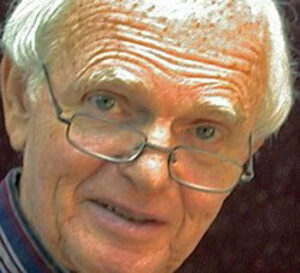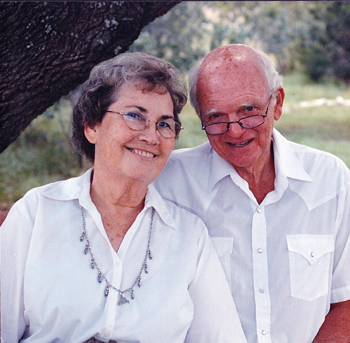By Mark Ellis —

In his youth, he was already a firmly committed atheist, and his career path as a computer scientist only reinforced his views, but his wife’s flat tire one day in their Ford truck prompted a change in direction.
“I decided on my own at 18 that God didn’t exist,” says Wallace “Shaun” Shaunfield, who designed computer chips for Westinghouse, Texas Instruments, and Honeywell during his career as a computer scientist.
His wife Barbara, a devout Nazarene, broke up with him five times before they finally married.
After they moved from Dallas to Boerne, Texas, Barbara realized she had to drive an hour to get to the closest Nazarene Church. “She religiously got up and went to church on Sunday and I religiously stayed home,” Shaun recounts.
“I never darkened the door of a church except for a wedding or funeral,” he adds.
One Sunday morning on her lengthy commute to the worship service, their Ford F250 blew a tire. Barbara sat on the side of the road, crying and praying for assistance.
She finally got help with the tire, but when she returned home several hours later, she unloaded on Shaun. “I’m not going to do this anymore,” she declared.
“I’m going to start over at the Methodist Church nearby, but I’m not going alone. You have to go with me.”
Shaun was apologetic and agreed to go with her on Sundays.
After a few weeks in church, a strange thought entered his mind as he sat in the pews: Maybe I’ve been wrong all these years…maybe I should take an objective look at my unbelief.
He read Lee Strobel’s book, The Case for Faith, which dealt with many of his rationalistic objections.
One hot August night he couldn’t sleep. He got up at 3 a.m., went outside on the porch and sat down in a porch swing in the moonlight. He began to take inventory of what he had learned.
“I realized Jesus really did exist,” he admitted to himself. “I realized the miracles were performed and true, because if they weren’t true, people would have said something. I realized the resurrection occurred.”
Suddenly, a dawning realization gripped his heart. I have more belief than I have doubt!
In the pale glow of a moonlit night, Shaun accepted Jesus as his Lord and Savior and was born again.
Shaun was the last person in their immediate family to find faith. He has two son-in-laws who are actively involved in ministry.

Sadly, Barbara died from pancreatic cancer five months after his conversion. Shaun felt God’s presence during this terrible season. “He gave me signs to show me He was with me,” Shaun recalls.
After her passing, Shaun went on a “Walk to Emmaus” retreat, where he felt God’s nudge to begin writing. “I became a fanatic, radicalized Christian,” he says, “and became very interested in apologetics.
He recently published Humans: the fascinating story of how early Homo sapiens became modern humans. He believes the appearance of Homo sapiens was an act of God and that humans did not begin to realize full consciousness until 10,000 years ago.
“I used to believe science and God were in contradiction. Now I can’t find a single area where they are.”
If you want to know more about a personal relationship with God, go here




I rejoice Shaun became a Christian. Salvation is of the Lord! (Jonah 2:9)
A warning about Walks To Emmaus (W2E):
The primary problem with “Emmaus Walks” and The Road to Emmaus “ministry” is that it does not originate in the Bible, God’s revealed will for His people.
The Bible teaches that Christian unity is based on the truth (1 Timothy 3:15); W2E promotes unity at the expense of it. Nearly every viewpoint is accepted, none are excluded, except the viewpoint that God does not countenance the practice. This unbiblical “tolerationalism” is grounded in relativism. The unity promoted by W2E is based on subjective experience, not on the objective truths of Scripture.
W2E makes unbiblical concessions to Roman Catholicism and the Charismatic Movement. Rome is the originator of W2E, and has put itself at the center of in its effort to assimilate the “lost sheep” of Protestantism.
W2E is Para-church, and usurps the prerogatives of the local church:
W2E takes to itself the teaching ministry;
It assumes the evangelistic responsibility of the churches;
It assumes oversight of the lives of Christ’s people.
W2E puts itself into competition with the local church.
In its concessions to the Charismatic Movement (also countenanced and contributed to by Rome) W2E promotes the degradation of the intellect for emotionalism, an unreasonable emphasis on experience—not that of Christ, but of the self—which leads to subjectivism.
W2E compromises the Gospel of Gods’ sovereign grace by substituting Man-centeredness with Christ-centeredness.
The above criticisms indicate that W2E is not a movement of the Holy Spirit utilizing Gods’ Word, but is in fact an unbiblical movement initiated by men that is both dangerous and heretical, in the root and in it’s fruit.
None of the analogies that Scripture uses to symbolize and illustrate Gods’ kingdom allow a principle for W2E to justify itself.
Thank you for your insightful comments, Ron. I believe that the majority of the time a believer’s conversion comes about with a great deal of emotion (especially in children and teenagers). The problem comes when that’s where it stays, and it’s as if you don’t “feel” saved unless you have a five-hanky emotional experience every Lord’s Day. I think a mature believer will have most of their emotional meetings with a God in their daily walk as we are broken down over our sin. It’s like the difference between hymns and worship choruses. I love both. Worship choruses are uplifting and encouraging, reminding us of what God has done and will do–but they elicit a primarily emotional response. Hymns, whether the traditional form or the modernized versions which use the same words, are straight out of Scripture. I love both, and am blessed beyond measure to be in a church where both are utilized in the worship service. Those who insist it has to be one or the other and sniff derisively, I have zero patience with though I try not to get into a pointless argument. I’m not going to change their mind, and they’re not going to change mine. After all, that is what Jesus prayed–“Father, I pray that they be one, even as you and I are one.” What we agree on is far and away more important than what we disagree on.
I don’t know anything about the Walk to Emmaus so cannot comment on that, but I have to disagree with your remarks about the charasmatic movement. There is a widely held stereotype that charasmatics are relying on emotionalism rather than being grounded in the Word of God. This may be true of some, but definitely not all. I have known charasmatics who are rigorously intellectual and theologically sound. One of them was a bishop who spoke 5 languages fluently. He was a staunch cessationist until God convinced him otherwise. Dr. Martyn Lloyd-Jones believed in a sealing of the Spirit (or baptism in the Holy Spirit) separate from salvation, and argued his point from Scripture. It is found in his book ‘Joy Unspeakable’.
My personal belief in the enduring existence and value of all the gifts of the Holy Spirit is rooted in the Word of God. I have also seen them in use and seen the good that has come from it (repentance, increased love for God and holiness). Satan knows how valuable the gifts are to the Church of Christ, hence they are attacked in two ways – discrediting them and counterfeiting them.
If one is “rooted in the Word of God” they will develop discernment as to what spiritual gifts in the Church are ongoing and what gifts were special, limited, sign, miraculous gifts for a specific purpose that has ceased. The idea that all gifts are for all times is simply not found in Scripture.
While we rejoice in Shaun’s redemption we should be troubled that he seeks to somehow harmonize so-called science (evolution) with Scripture. It cannot be done. Evolution does not fit in Scripture in any way. Scripture presents six literal creation days some six thousand years ago.
Spiritual babes shouldn’t be writing books.
Meanwhile, instead of chasing down those who will support one’s private interpretations of Scripture, we need to own up to the responsibility in the study of Scripture to seek the authorial intent – God’s intended message at the time it was given.
“Strange Fire” explains and documents the problems of the “charismatic” movement. It’s a movement which, unlike other genuine works of God in the world, has not contributed anything to a better understanding of theology. Where are the authors and where are the books from Charismatics expounding Scripture from consistent exegetical hermeneutics?
One of the reasons that many people do not believe is because of statements like dlarryb17’s second paragraph. He limits our God by telling God what He can and cannot do. That God created the universe is an important belief for Christians and the Bible tells us that. The Bible tells us that He spoke it in to being but is very short on details, in fact there two creation accounts in Genesis and they have some differences. I have always wondered how God would have explained light years and evolution to the writers of Genesis. Basically He just glossed over those details. If the earth (and I am supposing the universe) had been created some six thousand years age how does the light from stars reach us from stars that are more than six thousand light years away. I believe you are either trying to make the Bible into a history book or everything was actually created six thousand years ago and the God included age in his creation so that his rules of nature would prove out. In other words the dinosaur bones and the remains of sea creatures on mountain tops as well as the light from stars several billion light years reaching us were part of his creation. Our God is greater than anything we can even imagine and can and did do a very wonderful thing with his creation so who are we to tell Him what He can do and what He can’t do. An honest scientist who lets his (or her) research point the way without twisting the outcome based on preconceived notions is just decoding God’s creation and what a wonder it is. If we quit attacking science based on what we think the Bible is saying then we will learn more about God’s creation without having to look over our shoulders to see who watching. What is more important: how many angels can dance on the head of a pin or belief in Jesus as our Lord and Savior? Ask Galileo Galilei – or haven’t we learned our lesson yet?
A correction to what I sent in yesterday.
One of the reasons that many people do not believe is because of statements like dlarryb17’s second paragraph. He limits our God by telling God what He can and cannot do. That God created the universe is an important belief for Christians and the Bible tells us that. The Bible tells us that He spoke it in to being but is very short on details, in fact there two creation accounts in Genesis and they have some differences. I have always wondered how God would have explained light years and evolution to the writers of Genesis. Basically He just glossed over those details. If the earth (and I am supposing the universe) had been created some six thousand years ago how does the light from stars reach us from stars that are more than six thousand light years away. I believe you are either trying to make the Bible into a history book or everything was actually created six thousand years ago and the God included age in his creation so that his rules of nature would prove out. In other words the dinosaur bones and the remains of sea creatures on mountain tops as well as the light from stars several billion light years reaching us were part of his creation. Our God is greater than anything we can even imagine and can and did do a very wonderful thing with his creation so who are we to tell Him what He can do and what He can’t do. An honest scientist who lets his (or her) research point the way without twisting the outcome based on preconceived notions is just decoding God’s creation and what a wonder it is. If we quit attacking science based on what we think the Bible is saying then we will learn more about God’s creation without having to look over our shoulders to see who watching. What is more important: how many angels can dance on the head of a pin or belief in Jesus as our Lord and Savior? Ask Galileo Galilei – or haven’t we learned our lesson yet?
Another Engineer.
One of the reasons that many people do not believe is because of statements like dlarryb17’s second paragraph. He limits our God by telling God what He can and cannot do. That God created the universe is an important belief for Christians and the Bible tells us that. The Bible tells us that He spoke it in to being but is very short on details, in fact there two creation accounts in Genesis and they have some differences. I have always wondered how God would have explained light years and evolution to the writers of Genesis. Basically He just glossed over those details. If the earth (and I am supposing the universe) had been created some six thousand years ago how does the light from stars reach us from stars that are more than six thousand light years away. I believe you are either trying to make the Bible into a history book or everything was actually created six thousand years ago and God included age in his creation so that his rules of nature would prove out. In other words the dinosaur bones and the remains of sea creatures on mountain tops as well as the light from stars several billion light years reaching us were part of his creation. Our God is greater than anything we can even imagine and can and did do a very wonderful thing with his creation so who are we to tell Him what He can do and what He can’t do. An honest scientist who lets his (or her) research point the way without twisting the outcome based on preconceived notions is just decoding God’s creation and what a wonder it is. If we quit attacking science based on what we think the Bible is saying then we will learn more about God’s creation without having to look over our shoulders to see who watching. What is more important: how many angels can dance on the head of a pin or belief in Jesus as our Lord and Savior? Ask Galileo Galilei – or haven’t we learned our lesson yet?
Another Engineer.
Comments are closed.